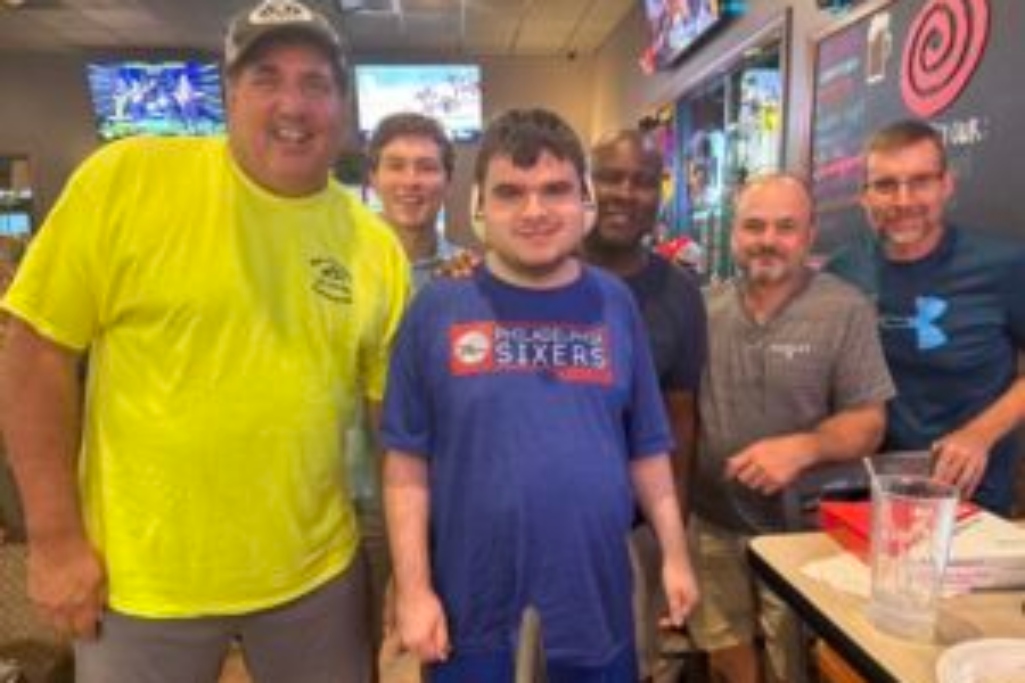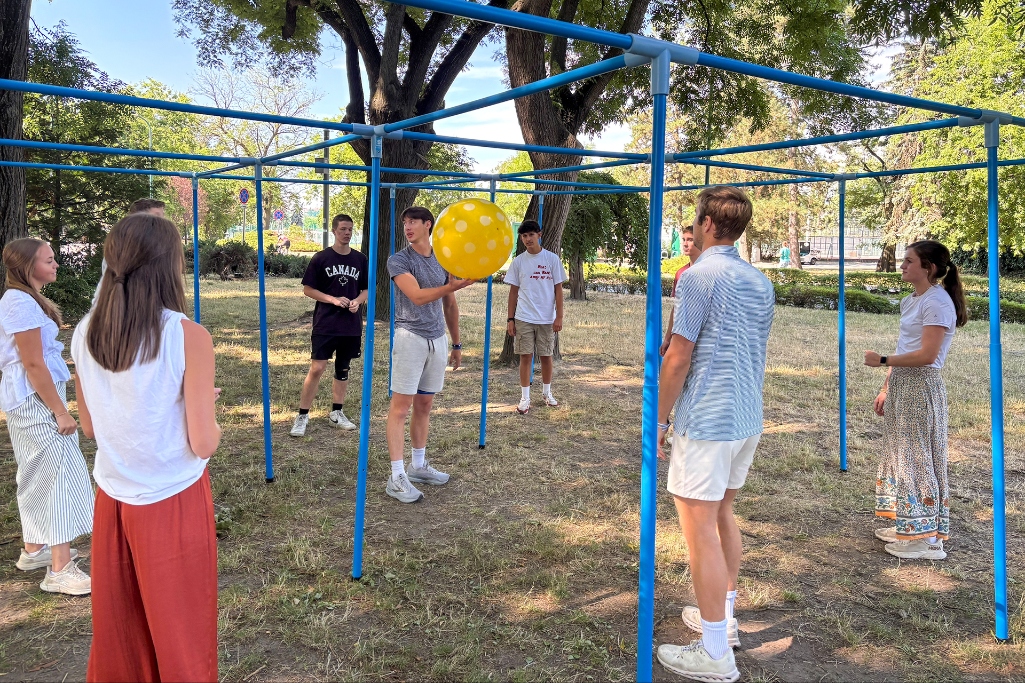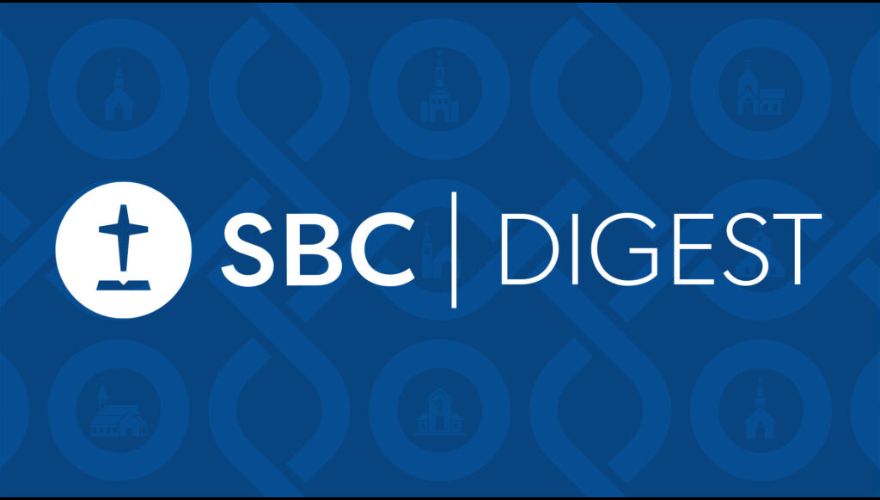
Tom Stolle's son Jimmy, front center, is autistic with related disabilities, but understands and embraces the gospel as presented to him by a trusted group of men at High Tide Church in Dagsboro, Del.
NASHVILLE (BP) — The Southern Baptist Convention (SBC) Executive Committee (EC) voted Sept. 23 to form a task force to study the availability of Special Needs Ministry resources for member churches, approving a referral from messengers to the 2025 SBC annual meeting.
Tom Stolle, executive director of the Baptist Convention of Maryland/Delaware, and the father of an adult special needs son, has agreed to chair the task force whose members will be appointed by EC Chairman Tony Dockery.
The two leaders are already collaborating on selecting a task force of no more than 15 members, Dockery said, to include those active with the special needs community either professionally, ministerially or through familial relationships.
The task force will fulfill a need that has been discussed in several national meetings, Dockery said.
“This is a community in our communities that is often neglected. The SBC is ready now to step more pointedly into this concern,” Dockery told Baptist Press. “Putting this task force together of individuals that work with (special needs individuals), have ministries in their churches, even have children in their homes, will help us to shape this.
“It’s a sensitive issue that we haven’t put a lot of attention into in the past,” Dockery said, “and now it’s going to be very prevalent in the present and future.”
Stolle, whose adult son Jimmy is enriched by the “Wonderfully Made” ministry to the special needs community at High Tide Church in Dagsboro, Del., said such ministries are crucial in reaching the lost.
“If the church doesn’t embrace children affected by disabilities, those entire families are excluded from worship and fellowship. God made these individuals in His image for His purposes,” Stolle said. “The church must include them or the church itself is disabled.”
Stolle said he hopes to lead the task force to:
- Assess resources available to Southern Baptist churches so that churches can be much better equipped to knit into the fabric of the church individuals and families affected by disabilities.
- Assess the methods churches are using to excel in including the special needs population and their families and learn from those successful congregations.
- Assess how churches can better come alongside individuals and families affected by disabilities by loving and serving them.
Jesus died for individuals affected by disabilities, Stolle emphasized.
“The lostness in the disability community is astounding. I believe it is the world’s largest lost people group,” Stolle said. “Therefore, the church must include these special individuals by loving and serving so that the gospel can be not just effectively shared but also lived out.
“Any ‘comprehensive evangelism strategy’ that does not include individuals affected by disabilities is not a comprehensive strategy,” he said. “It is a partial strategy.”
The new group is tasked with submitting its findings first to the Executive Committee in preparation for a report to messengers to the 2026 SBC annual meeting in Orlando, a process EC President and CEO Jeff Iorg commends.
“Our goal is for the task force to report to the Executive Committee next spring, have their report shaped and adopted by the Executive Committee, and then presented to the SBC in June 2026,” Iorg said. “We believe this process will significantly enhance this important ministry area for Southern Baptist churches, associations, state conventions and national entities.”
The EC also asked the group to consider the addition of a Disability Ministry Sunday to the SBC calendar. Messengers to the 2025 SBC annual meeting referred the request to the EC, but members denied the request, instead referring it to the new task force.
Dockery anticipates the group will be in place within a month.
About 8.4 million people in the U.S. were affected by an intellectual or developmental disability in 2020, the University of Minnesota Institute on Community Integration found in an analysis.
Almost all Protestant pastors and churchgoers (99% and 97% respectively) believe a person with disabilities would feel welcome and included at their church, Lifeway Research found in 2020, but families of people with special needs told Lifeway that churches fall short.
Stolle’s son Jimmy is nonverbal with severe autism and related disabilities, but is certain of the church’s love for him, Stolle said.
“As a father of a son affected by significant disabilities, I have learned that there is no substitute for loving inclusion,” he said. “My church makes it a priority that my son receives the gospel every week, and that he has the opportunity for relationship with others in the church.”
At High Tide Church, a group of five men actively minister to Jimmy and present the gospel in a way that is accessible to him, Stolle said.
“Jimmy cannot speak and is severely developmentally challenged, yet God has changed his heart. It’s obvious,” Stolle said. “I’m convinced God used His church to make this happen. Our church believed and put into practice (that) Jimmy needed Jesus and was worthy of receiving the message in the way he can.
“That’s a massive demonstration of love. That is what I pray (every) local church will embrace.”
(EDITOR’S NOTE — Diana Chandler is Baptist Press’ senior writer.)


